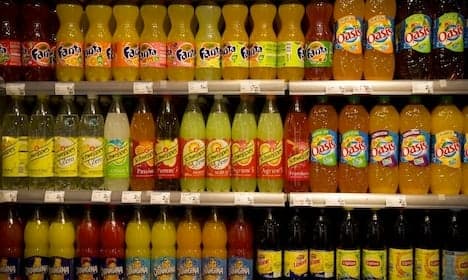France could hike taxes on soda and chocolate bars

A new report has urged the French government to up taxes on fizzy drinks or soda as well as chocolate bars.
A can of coke and a Mars bar could soon become a much pricier snack in France.
The shock report was presented to the French parliament on Monday and it includes a proposal was made to significantly increase the tax on sugary drinks.
The current tax stands at €7.53 per hectolitre, or 2.51 centimes for each can of soda.
These amounts would rise to €21.47 per hectolitre or 4.6 centimes per 33cl can of soda if the proposal were to go ahead.
The idea of the tax rise would be to compensate for a drop in VAT on other more essential products like oil, margarine and flour.
Authors of the report Véronique Louwagie, an MP from Les Republicains party and Razzy Hammadi, a Socialist Party MP, say the measure alone would generate €590 million per year for the state.
The first targeted tax on all sugary drinks in France was introduced in January 2012.
Officially, the new taxation was introduced to combat obesity and following its introduction sales of soft drinks fell three percent in the first year and two percent in the second.
In October 2013, the French government also created a new tax on energy drinks, such as Red Bull.
The latest proposal would also include sugary foods, following Denmark's 'fat tax' model. The VAT on chocolate bars would be hiked up to 20 percent, compared to the current 5.5 percent.
The report states that the current tax on high sugar foods is too low: “There is nothing that justifies a 5.5 percent VAT being applied to a snack containing high sugar quantity, fatty acid and particularly high saturated fat”.
The report's authors estimate that this tax rise would bring in €50 million per year.
Marine Desorge, who is responsible for food at CLCV (National Association for the defence of consumerism) is opposed to the idea.
She told a Finance Commission: “A few cents more is not going to motivate the population to change their habits when the determining factor for people buying these products is not the price”.
“New taxes would hit modest households the hardest. It is the same households who at the same time are exposed to problems of obesity and for whom decisions on diet rely on the cost”.
“It would be more useful to lower the taxes on fruits and vegetables”, she suggested.
Comments
See Also
The current tax stands at €7.53 per hectolitre, or 2.51 centimes for each can of soda.
These amounts would rise to €21.47 per hectolitre or 4.6 centimes per 33cl can of soda if the proposal were to go ahead.
The idea of the tax rise would be to compensate for a drop in VAT on other more essential products like oil, margarine and flour.
Authors of the report Véronique Louwagie, an MP from Les Republicains party and Razzy Hammadi, a Socialist Party MP, say the measure alone would generate €590 million per year for the state.
The first targeted tax on all sugary drinks in France was introduced in January 2012.
In October 2013, the French government also created a new tax on energy drinks, such as Red Bull.
The latest proposal would also include sugary foods, following Denmark's 'fat tax' model. The VAT on chocolate bars would be hiked up to 20 percent, compared to the current 5.5 percent.
The report states that the current tax on high sugar foods is too low: “There is nothing that justifies a 5.5 percent VAT being applied to a snack containing high sugar quantity, fatty acid and particularly high saturated fat”.
The report's authors estimate that this tax rise would bring in €50 million per year.
Marine Desorge, who is responsible for food at CLCV (National Association for the defence of consumerism) is opposed to the idea.
She told a Finance Commission: “A few cents more is not going to motivate the population to change their habits when the determining factor for people buying these products is not the price”.
“New taxes would hit modest households the hardest. It is the same households who at the same time are exposed to problems of obesity and for whom decisions on diet rely on the cost”.
“It would be more useful to lower the taxes on fruits and vegetables”, she suggested.
Join the conversation in our comments section below. Share your own views and experience and if you have a question or suggestion for our journalists then email us at [email protected].
Please keep comments civil, constructive and on topic – and make sure to read our terms of use before getting involved.
Please log in here to leave a comment.